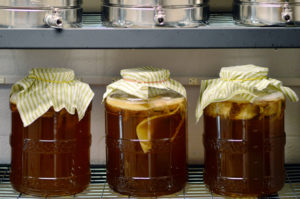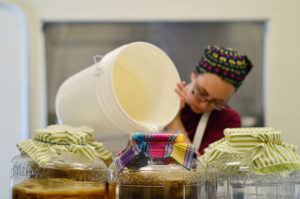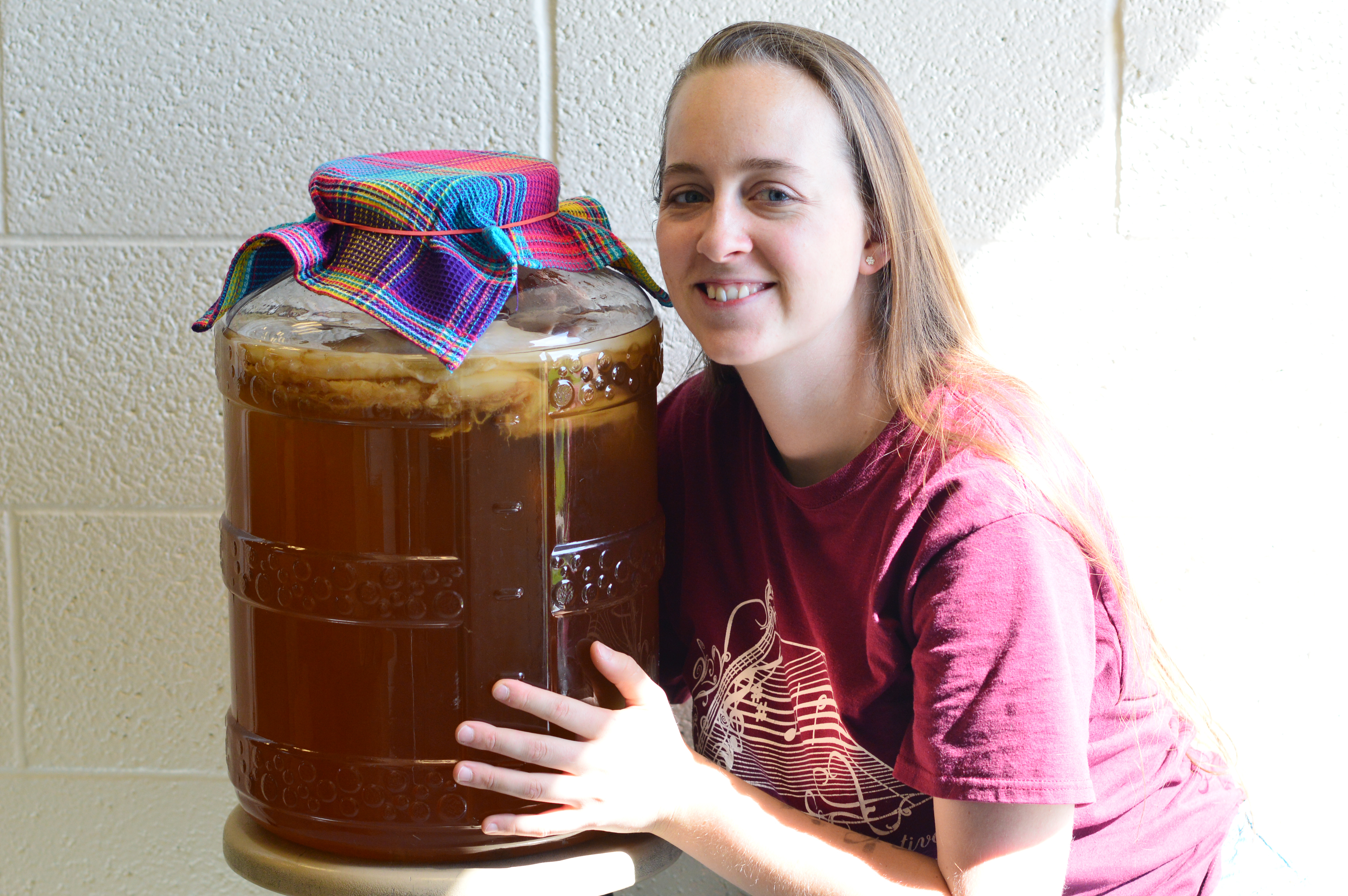Junita Lapp was working at a health foods store when she developed a passion for kombucha.
“It took me around two bottles to get used to it,” Lapp says. “I didn’t like it at all when I first started drinking it, but I just kept drinking it because I knew it was really good for me. And after two bottles, surprisingly it grew on me.” She wanted to learn how to make it herself.
Lapp says that is a common reaction of kombucha lovers. Rarely, however, does that reaction grow into a business. Lapp It Up Kombucha is a small-scale kombucha brewery opened by Lapp, fermenting and crafting small batches out of Zanesville in Muskingum County and sold all over Southeast Ohio.
What Is Kombucha?
Kombucha is a fermented tea made by placing a symbiotic culture of bacteria and yeast, called a scoby, in a large container of sweet tea and letting it ferment for one to two weeks. The scoby takes fuel from the sugar and nutrients in the tea to create a fizzy, sweet and somewhat vinegary drink.

The true origin of kombucha is unknown, but many believe it was invented in the Qin Dynasty (220BC) for the Emperor Qinshi Huangdi as a longevity elixir, according to KombuchaKamp, a popular networking website for kombucha brewers and drinkers.
Another story states that a Korean doctor brought it to Japan in 414 A.D., and others write that the beverage was carried in the flasks of Genghis Khan’s armies. The tea then traveled via the Silk Road and was spread through Russia and Europe.
Kombucha has grown in popularity over the decades. It spread through grassroots efforts, and it wasn’t until recently that it has begun to explode in popularity and be sold commercially.
There are numerous health claims about the drink that began when it was first created, ranging from aiding in digestion, fighting off infection and promoting positive mental health. That’s why many people call kombucha the “tea of immortality,” or the “magic juice.”
“There’s a lot of people that make crazy health claims about it, but I don’t do that,” Lapp says. “I just say it’s a general ‘get healthy, balance your body’ type of thing.”
Popular Health Benefits of Kombucha
- Contains antioxidants
- Rich in acetic acid and gluconic acid, which can kill bacteria and aid in detoxification
- Slows digestion of carbs, which can reduce blood sugar levels and improve liver and kidney function
- Rich in B and C vitamins
- Increases metabolism when consumed before meals
The Business of Brewing
Lapp got her first scoby from her coworker’s mom at the health foods store, and she helped Lapp make her first batch. After that, Lapp began making kombucha in her home.
“Before long, my basement was full of it and it smelled like vinegar like crazy down there,” Lapp says. She began sharing her kombucha with friends and family, and from there it naturally evolved into a business.

When Lapp began brewing commercially, her only flavor was strawberry. Over a period of two years, she now has four consistent flavors: strawberry, lemon ginger, blueberry cardamom and blackberry blossom. There are also some seasonal flavors, including spiced cranberry during winter.
Lapp has some new permanent flavors in development as well, but she’s not ready to release any information on them yet.
Lapp is also working on setting up a tap system so her kombucha can be served at breweries and coffee shops. The first place the new tap system will launch is Comune, a new vegan restaurant in Columbus.
“We are very excited that we were able to find an Ohio kombucha that is willing to keg,” says Brook Maikut, the owner of Comune. “We don’t really offer bottles and cans so we can keep down on waste, so we are happy that Junita is working with us to have her tea on tap.”
Locally Sourced, Locally Sold
All of Lapp It Up Kombucha’s ingredients are made using locally sourced and organic ingredients. Lapp feels that it is her responsibility to give back to the community that helped her grow.
“Why go buy outsourced from other communities or out of state or out of the country, because in the long term if we all do that then no one is going to be able to survive,” Lapp says. “I’m a small business, so I need people to buy local from me because I don’t want to sell out of state. I only sell locally here, so I’m just trying to practice what I preach and do the same as I want to be treated.”
For Lapp, brewing kombucha is not only a business, but an art. Over the past two years she has spent time in her kitchen finding the perfect brewing time before the drink gets too sour, the best ingredients and organic teas, and the best flavors.
“Anybody can make kombucha, but it takes some care and thought to make it really taste good,” she says. “The more time you put into it the better it will turn out.”
SEO
Related posts
What’s Inside
- Behind the Bite (68)
- Features (124)
- In Your Neighborhood (102)
- Photo Essay (4)
- Read the Full Issue (8)
- Talking Points (48)
- The Scene (15)
- Uncategorized (3)
- Web Exclusive (5)
- What's Your Story? (21)



Find us on Social Media